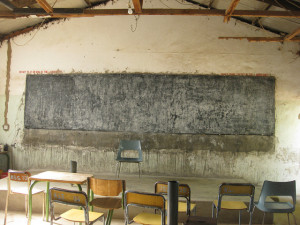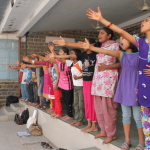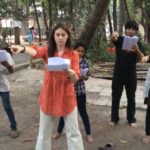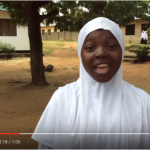“When I look back on my own education, I honestly don’t remember much of what was written on chalkboards. I do remember the moments when a teacher looked beyond the chalkboard and made learning more interesting and even fun at moments. I cherish today my memories of moments when a teacher engaged me or inspired me or helped me to use my voice.” Jennifer Holmes, Ph.D.
By Jennifer Holmes & John Socas
 In 2006, Jen was invited to participate in an educational theatre program at schools off the coast of mainland Tanzania in Zanzibar. The project was life changing and eye opening. At the schools she visited, boys were often called upon to answer questions, while girls sat silently. Many of the girls she spoke with talked about dreams of higher education and better opportunities, but lamented that, as women, these opportunities might not be available to them.
In 2006, Jen was invited to participate in an educational theatre program at schools off the coast of mainland Tanzania in Zanzibar. The project was life changing and eye opening. At the schools she visited, boys were often called upon to answer questions, while girls sat silently. Many of the girls she spoke with talked about dreams of higher education and better opportunities, but lamented that, as women, these opportunities might not be available to them.
After speaking with teachers and administrators at the schools, she realized that many people were aware of the women’s lack of voice in both the classroom and the community. The Ministry of Education in Zanzibar put forth a number of policies to help bring more opportunities for women, and although there was a significant increase in the number of girls enrolled in schools, the culture in the classroom remained unchanged.
Due to colonial influence, imitation and repetition are a major part of teaching and learning in Zanzibar. In many classrooms, teachers spend class after class covering chalkboard after chalkboard with copious notes. This method of instruction is teacher-centered and offers little hope of active student participation or positive interaction between boys and girls in the classroom.
We wondered how the lack of a creative outlet in school, one through which students could express themselves and their ideas, affected the girl’s perceptions of themselves and their roles in society. We saw the potential of arts-based techniques to serve both male and female students by encouraging critical interaction. We were certain these techniques would inspire more responses and engagement from the girls in the class.
To combat the disparity between the voices of boys and girls in the classroom, we developed a program that blended applied and educational theatre techniques. We piloted the program in Zanzibar in the summer of 2007. By 2010, workshops were being conducted in India, Myanmar, the United States, and we were joined by two accomplished teachers, Maya Turner Singh and Ashley Olson.

When we first arrived in Zanzibar we saw a library that had been built years before but still had no books on the shelves. Generous donors from overseas had built a library but had been unable to or had forgotten to put books on the shelves.
The villagers were so very proud of their library but wondered year after year when the promise of the library would be kept. When we returned the next year, our suitcases were brimming with books.
As Global Empowerment Theatre has grown, we have taught students to fill their own empty shelves with stories from their own lives. Each young person who learns from our workshops how to tell their own stories can fill an empty shelf. Each teacher we inspire to help their students use their voices and tell their stories can fill an empty library.
Many of us have a memory of a moment in our lives when we have felt powerful, as if we could take on the world and win. Without such moments, how can children envision success? How will they develop the confidence to achieve great things? Global Empowerment Theatre provides children with opportunity to be heard, and for many it is the first time they have ever shared their voices. We can think of nothing more empowering.



